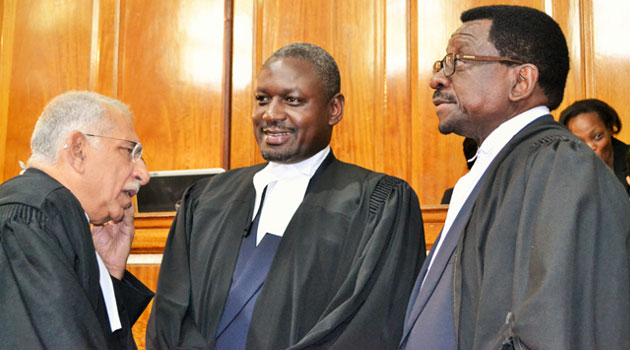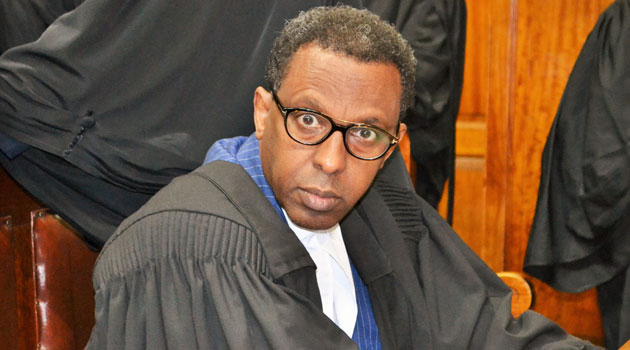
Chief Justice David Maraga, his deputy Philomena Mwilu, Isaac Lenaola and Smokin Wanjala (in absentia) sought to show why elections are more than just about numbers amid a clamouring led by President Uhuru Kenyatta that they were misguided in not ordering a recount of the votes cast/MOSES MUOKI
NAIROBI, Kenya, Sep 20 – The Supreme Court on Wednesday laid bare its reasons for – by a majority – declaring the August 8 presidential election and the result thereof, null and void.
Chief Justice David Maraga, his deputy Philomena Mwilu, judges Isaac Lenaola and Smokin Wanjala (in absentia) sought to show why elections are more than just about numbers, amid a clamouring led by President Uhuru Kenyatta that they were misguided in not ordering a recount of the votes cast.
“Elections are not just about numbers… even in numbers, we used to be taught in school; to arrive at a mathematical solution, there is always a computational path that one has to take.”
“Elections are not events but processes as many, even senior lawyers, would like us to believe. Incidentally, IEBC’s own elections manual recognises that indeed an election is a process,” Deputy Chief Justice Mwilu stated.
In a stinging indictment of the Independent Electoral and Boundaries Commission, the four judges went to great lengths to demonstrate why the comparison of the electronic results transmission system with a ‘matatu’ by President Kenyatta’s counsel, was misguided.
Fundamentally, they found IEBC failed in its constitutional duty to verify the results by going ahead to declare a final result and winner, before receiving scans of a significant number of result forms from the polling stations (Forms 34A).
“What remained uncontroverted by the Chief Executive Ezra Chiloba’s own admission was that three days after declaration of results, IEBC was not in a position to supply all the Forms 34A to the petitioner,” Mwilu stated.
The judges found IEBC’s explanation that the transmission of the 10,000 forms in question was hampered by network challenges, wanting.

The judges found IEBC’s explanation that the transmission of the 10,000 forms in question was hampered by network challenges, wanting/MOSES MUOKI
They pointed out that the IEBC was – by its own admission – aware that over 11,000 polling stations were in areas not covered by the 3G and 4G networks and wondered why the concerned Presiding Officers did not with immediacy make their way to areas with adequate network coverage. This, they found, could not be blamed on technology failure and viewed it as a deliberate violation of the law.
They also did not buy IEBC’s contention that the Court of Appeal finding in the Maina Kiai case that the presidential election results as declared by the Constituency Returning Officer to be final, made the Forms 34B (constituency tally forms) their primary concern.
In reading their judgement, Mwilu quoted the Appellate Court as describing the result as declared at the polling station as being the true reflection of the sovereign’s will given the transparent environment in which the tallying took place.
And the Appellate Court’s finding, they found, did not clear the way for the IEBC to pick and choose which provisions of the election law to comply with.
They also found that the IEBC had inadequately, if at all, explained the discrepancies identified in an audit of the result forms and wondered why, if indeed they came from the same printer, the Forms 34B did not possess the same features.
The IEBC having submitted that to err is human, and there was susceptibility to fatigue and that they were not legally required to ensure that the constituency result forms bore standard security features.

The judges found IEBC’s explanation that the transmission of the 10,000 forms in question was hampered by network challenges, wanting/MOSES MUOKI
The IEBC, they found, had also failed to convincingly explain the difference in the total number of votes cast for president and those cast for the other elective seats.
“It was obvious to us that IEBC misunderstood the petition and therefore jumbled its responses,” Maraga stated.
And with two on the bench dissenting with their opinion, they sought to make plain that while they were alive to the fact that not all irregularities warranted an annulment, the irregularities and illegalities in this case – they found – were substantive in nature.
They however refrained from pronouncing themselves on whether it was proper for Cabinet Secretaries to have campaigned for President Kenyatta and whether he improperly sought to influence the voter in his favour and misused public resources by advertising his government’s achievements in the campaign period through the Presidential Delivery Unit.

The judges also found that the IEBC contemptuously fumbled a “golden opportunity” to prove that contrary to Raila Odinga’s assertions, their electronic results transmission system had not been compromised/MOSES MUOKI
His counsel had defended the actions as being those of a government keen on fulfilling its constitutional obligation of accountability to the electorate.
The judges also found that the IEBC contemptuously fumbled a “golden opportunity” to prove that contrary to Raila Odinga’s assertions, their electronic results transmission system had not been compromised.
“Where does this leave us?”Mwilu posed. “It leaves the court with no option but to draw an adverse inference against the party refusing to comply.”
And while it was not in contention, they said, that the ballot casting process itself had largely taken part in a transparent manner under the watchful eye of observers, it had turned opaque, they found, at the results verification and tallying stage.
A most critical of stages which they said, was the focus of the electoral reforms that followed the 2007/8 post-election violence.
“As judges we have taken an oath of fidelity to the Constitution… For what is the need of having a Constitution if it is not respected,” Maraga said in winding up.
Remarks which echoed those he made on Tuesday when he made it clear that they did not serve at the pleasure of the Executive and were the two arms of government to crawl into bed together, how tragic it would be.
Fundamentally, they found IEBC failed in its constitutional duty to verify the results by going ahead to declare a final result and winner, before receiving in scanned format, a significant number of Forms 34A from the polling stations.
“What remained uncontroverted by the Chief Executive Ezra Chiloba’s own admission, was that three days after declaration of results, IEBC was not in a position to supply all the Forms 34A to petitioner,” Mwilu ruled.









































